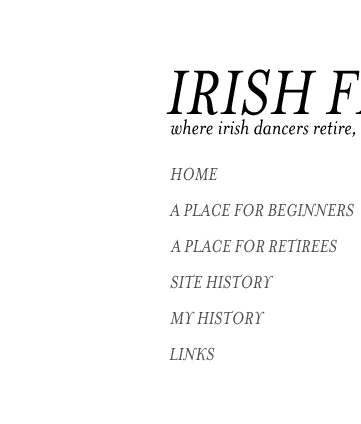

1.) A dance diary.
2.) A dance gallery.
In 1996, something happened.
That's right. I went to the Bellingham Highland Games. Confusingly, Riverdance debuted on PBS later that year, and, putting two and two together, I decided to become a Highland Dancer.
My parents did not encourage the decision. They did not discourage the decision. They did not, as I recall, do anything at all. If they had, Irish Feet might be Scottish Feet. If they had, they would have discovered how convenient Highland Dance was for a girl born and raised on Whidbey Island.
In 1997, a Scottish shop opened up near our home. It countered the Irish shop somewhat north, and it carried Highland Dance costumes and shoes. To this day, I remember picking up a set of ghillies and telling my mother that it was a good thing I hadn't started, because $40 for a pair of shoes was really expensive. As I recall, she didn't have much of a reaction. Apparently she understood that dance shoes are not street shoes.
That same year, I moved.
That same year, my mom called a Highland Dance school in my new location of Spokane. I decided the lessons were too close to dinner and declined. Another near-miss.
I was ten, and still thinking that Highland Dance was the thing in Riverdance. Apparently my parents were equally uneducated (sad, considering my grandmother was from Glasgow and her father from Ballymena, but I digress).
But some time after that, we all automatically switched. There was no fanfare. No pipes. Perhaps by simple process of elimination or St. Pat's parades, we learned that Irish dance was Irish dance and Highland Dance was the stuff with the cooler costumes that had enticed me years before.
In March 2001, after waffling with the idea for five long years (even if at least two were spent confused), here was a documentary coupled with a showing of Riverdance. It showed Irish dancers in their competitive costumes, and I remember laughing in horror at how embarrassing they looked. How terrible. But inside, I wanted to be them.
A month later, I was.
My timing was so spectacularly convenient that I can't wrap my mind around it even a near-decade later. In the paper was an ad for Celtic dance at the local dance academy (one of many, really, but certainly local). Lessons were just starting. The teacher was brand new. The classes brand new. Everything was brand new, except the building.
I was thirteen and had just fallen in love.
I excitedly topped my tiny class, and excitedly joined two classes to increase my knowledge. I excitedly watched our school's first feis. I excitedly received my school dress and excitedly sewed the knotwork. I excitedly went to dance camp my first summer and to figure classes and rehearsals for a recital that seemed to take forever to arrive and was over in a flash of carpeted floors and poor air circulation. I excitedly danced in my first St. Pat's (though hardly my first parade) and performed for happy senior citizens. A rite of passage. I excitedly competed in my first feis, then my second, then my third, then my fourth. Then I excitedly bought a solo dress and wig, and excitedly performed on my first real stage in my first real theatre. And the excitement lasted, and I competed a half-dozen more times, from British Columbia to Illinois. I excitedly placed nearly everything in Prizewinner.
Then the excitement began to burn out. My foot began to ache. Parents began to moan. Dancers began to get attention for free time that I didn't have. Our head teacher, my teacher's mother, the seams of our little schools, passed away. We bowed to her casket, and I never wore my school dress again. There was no more excitement.
But I still loved the dance.
Irish dance consumes many, and from all accounts I have taken, affects the user permanently. This likely does not vary from any other dance form, but there is a certain kenetic energy of frustration and eye rolling when a group of Irish dancers get together to talk about the old days. When you are so close to something, you can't help but judge for the rest of your life, even if you wish you were out there still.
And yet, despite all the shit that pushed us in or out or around, we love it. We feel protective of it. We grit our teeth at Riverdance impressions and we continue to wag our fingers and say, "You don't call ballet 'Swan Laking', do you?" We keep our solo dresses until we need the money, and we keep our spike curlers just in case.
Everyone has a different story. I was shoved out of dancing because of a healthy mix of politics and injury. I regret only that I didn't stick it out a little longer. I regret only that I didn't work a little harder when everything got me down. I could have, but I chose not to do so. I returned until I couldn't, and I'd keep returning if such a thing were feasible. I love Irish dance. I love the people who taught me. I love the friends I made. I love sharing the ugly stories that never surfaced at the time, and reliving the ugly memories that surfaced all-too-frequently.
If I truly hated my time or was truly so disenchanted, I wouldn't have Irish Feet with me, nor would I willingly discuss Irish dance with anyone who had time to listen. I also wouldn't launch into rants at classmates who never knew me as an Irish dancer, about people they have never heard of. But I do. Because as bitter as an old dancer can be, we still consider ourselves dancers.